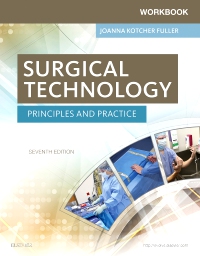
Workbook for Surgical Technology - Elsevier eBook on VitalSource, 7th Edition
Elsevier eBook on VitalSource

Correlating chapter-for-chapter with the text, Workbook for Surgical Technology: Principles and Practice, 7th Edition provides the essential practice and review needed to support classroom and clinical success. Easy to understand and simple to use, this Workbook includes terminology review, a variety of practice questions, and case studies with critical thinking questions for key surgical technology functions. Over 70 skills performance checklists let students evaluate their own learning.
Newer Edition Available
Workbook for Surgical Technology - Elsevier eBook on VitalSource
-
- EXPANDED! More than 70 skills performance checklists allow students to assess their own skills, helping prepare them for the certification examination.
- NEW! Exercises covering new content on dynamic topics, including professionalism, equipment and technology, robotics and lasers, and advances in orthopedic, cardiovascular, and neurological surgeries, ensures that students are exposed to the most current information and evidence-based practice.
- Correlates chapter-by-chapter to the text so students can use the Workbook seamlessly as they use the text and gain extra opportunities for practice to help ensure comprehension.
- EXPANDED! Additional labeling exercises provide more practice to improve students’ comprehension, especially regarding positioning, draping, and instruments.
- IMPROVED! More types of practice questions, encompassing recall, comprehension, and application, help better assess student comprehension.
- Robust practice opportunities include labeling activities and terminology review, fill in the blank, short-answer, and multiple-choice questions to help reinforce the learning outcomes, key terminology, and important concepts through active engagement and assessment of content mastery.
- Case studies feature related questions and present realistic clinical situations or scenarios that challenge students to expand their critical thinking skills and apply what they learn.
- Perforated pages allow students to remove some or all competency sheets for use in clinical evaluation settings. Pages can also be used for assessment and turned in at your discretion.
-
- EXPANDED! More than 70 skills performance checklists allow you to assess your own skills, helping prepare you for the certification examination.
- NEW! Exercises cover new content on dynamic topics, including professionalism, equipment and technology, robotics and lasers, and advances in orthopedic, cardiovascular, and neurological surgeries, ensures that you are exposed to the most current information and evidence-based practice.
- IMPROVED! More types of practice questions, encompassing recall, comprehension, and application, help better assess your comprehension.
- EXPANDED! Additional labeling exercises provide more practice to improve your comprehension, especially regarding positioning, draping, and instruments.
-
PART I: SURGICAL TECHNOLOGY PRINCIPLES
1. The Surgical Technologist
2. Communication and Teamwork
3. Law, Documentation, and Professional Ethics
4. The Health Care Facility
5. The Patient
6. Diagnostic and Assessment Procedures
7. Environmental Hazards
8. Microbes and the Process of Infection
9. The Principles and Practice of Aseptic Technique
10. Decontamination, Sterilization, and Disinfection
11. Surgical Instruments
12. Perioperative Pharmacology
13. Anesthesia and Physiological Monitoring
14. Postanesthesia Recovery
15. Death and Dying
16. Physics and Information Technology
17. Energy Sources in Surgery
18. Moving, Handling, and Positioning the Surgical Patient
19. Surgical Skin Preparation and Draping
20. Case Planning and Intraoperative Procedures
21. Management of the Surgical WoundPART II: SURGICAL TECHNOLOGY PRACTICE
22. Minimally Invasive Endoscopic and Robotic-Assisted Surgery
23. General Surgery
24. Gynecological and Obstetrical Surgery
25. Genitourinary Surgery
26. Ophthalmic Surgery
27. Surgery of the Ear, Nose, Pharynx, and Larynx
28. Oral and Maxillofacial Surgery
29. Plastic and Reconstructive Surgery
30. Orthopedic Surgery
31. Peripheral Vascular Surgery
32. Thoracic and Pulmonary Surgery
33. Cardiac Surgery
34. Pediatric Surgery
35. Neurosurgery
36. Emergency Trauma Surgery
37. Disaster Preparedness and Response



 as described in our
as described in our 